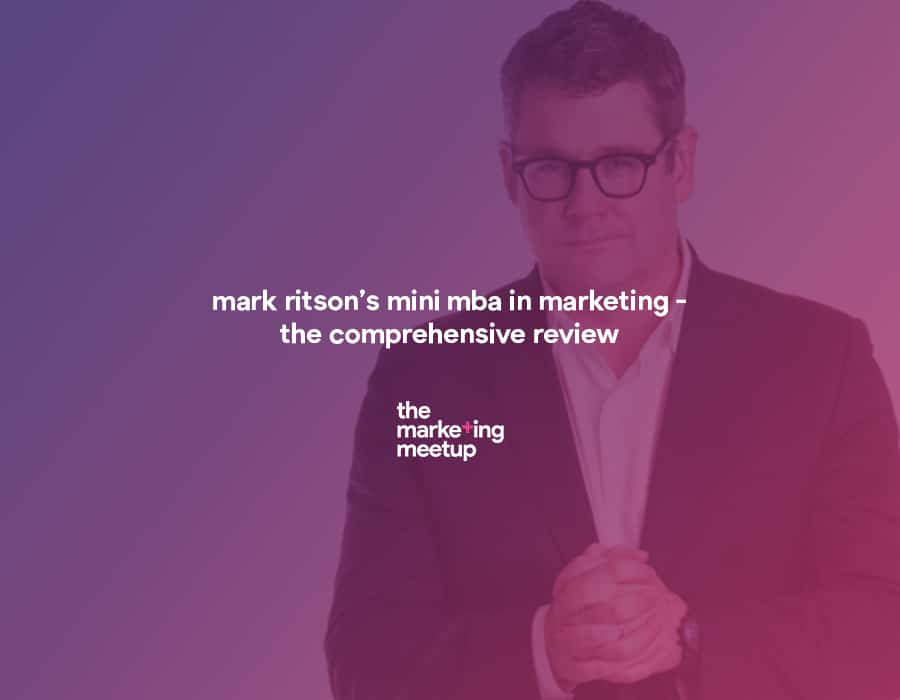The Mark Ritson Mini MBA review – Updated in 2023
Table of Contents
- The Mark Ritson Mini MBA review – Updated in 2023
-
- Mark Ritson’s Mini MBA – full disclosure
- My journey – why I chose to do the Mini MBA
- The course structure, logistics, and how I interacted with the Mini MBA
- Q&A with Mark Ritson
- The Mini MBA LinkedIn group
- How long do you need each week to complete the Mini MBA?
- What did I learn on the Mini MBA?
- The biggest takeaway from the Mini MBA with Mark Ritson
- The Mini MBA exam
- Questions from the community about the Mini MBA…
-
Note: This post was originally written in January 2022. It has since been updated in August 2023 with notes, highlighted as (2023 update:…).
Does being trained in marketing make you a better marketer? Mark Ritson, Marketing Professor, Mini MBA creator, and Marketing Week columnist, certainly says so.
In 2019, over half the marketers surveyed for Marketing Week’s Salary Survey said they have not studied a marketing-related academic or professional qualification of any kind. 53.8%, to be exact.
Despite eight years as a generalist marketer at the coalface, until the Mark Ritson Mini MBA, I, too, was one of the untrained majority.
Since then, I’m not entirely sure how that number has shifted, but what I do know is that The Mini MBA has become incredibly popular.
So I thought I’d write the review I’d have wanted to read before signing up and completing the Mini MBA in Marketing – one of the two MBA online courses ten-module Ritson offers (in collaboration with Marketing Week).
Spoilers for the scrollers…
…it was very good and I’d wholeheartedly recommend it.
Mark Ritson’s Mini MBA – full disclosure
I’ve done my best to be as straight down the line as possible, but it’s worth acknowledging a couple of things upfront:
- Mark has been a guest at The Marketing Meetup previously. In February 2022, Mark Ritson also sat down to answer our questions on the Mini MBA for an 1 hour+ Q&A session which was great fun. (Get on the newsletter for news when that’s released) (2023 update: video embedded below)
- In a couple of fleeting interactions with him in the past, I’ve liked Mark on a personal level. Equally, I do think he’s a big enough boy to take any thoughts that aren’t glowing praise (not that there are many!).
It’s also important to mention – for the avoidance of doubt – I paid for the qualification myself (there are no Mark Ritson Mini MBA promo codes!) and am not on an affiliate deal to write this post.
My journey – why I chose to do the Mini MBA
In a nutshell, three reasons:
One. I’m one of those ‘lifelong learner’ types, so the opportunity to learn something new was exciting to me.
Two. More significantly, one of my lightbulb moments of marketing came after watching the below video. I’ve recommended it countless times to the community since, regularly calling it the best marketing talk I’ve ever seen.
Ritson’s ‘Diagnosis, Strategy, Tactics’ model just made sense to me as a young marketer. It spoke to consistency. Knowing why you were doing what you are doing. And placing tactics in an appropriate place – rather than chasing the new, shiny things everyone I seemed to speak with seemed to be bothered about.
In the years since watching the video – I spoke about the model often, but my understanding of it was limited to what I could gather from the video, webinars and podcasts with Mark, and his regular column for Marketing Week. So to do a proper MBA marketing online course was pretty important for developing my own understanding even further.
Three. Finally, I can’t deny that the huge praise the Mark Ritson Mini MBA course gets from the community, that was a big deal!
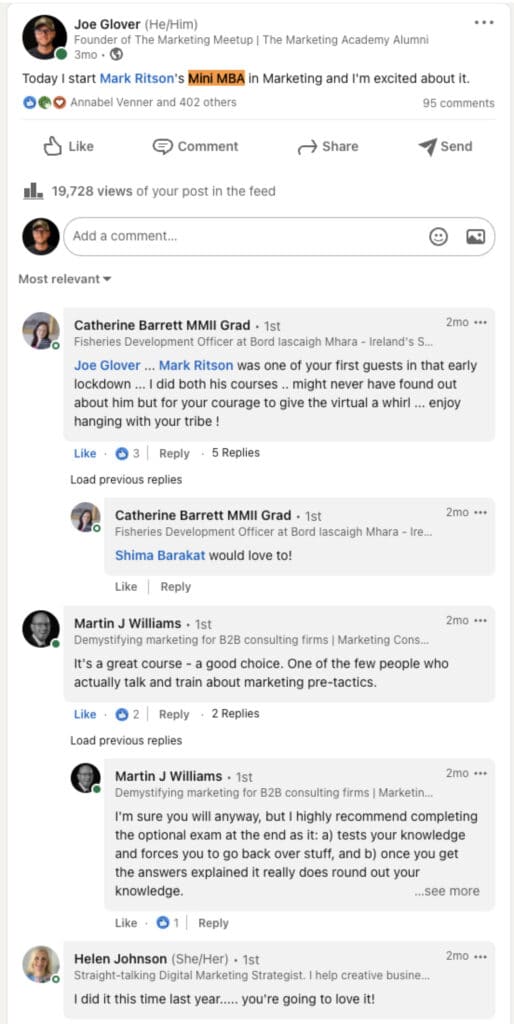
Having had my eye on the course for a long time, I decided to take the plunge to join the September 2021 cohort. The Mini MBA costs £1,450 + VAT (2023 update: now costs £1,895 – which I still deem to be good value for money), so I shut my eyes and looked away as I pressed the button to pay up!
I opted for the Mini MBA in Marketing (rather than the Mini MBA in Brand Management). I chose this course of the two because:
- I wanted to investigate diagnosis, strategy and tactics in more detail. Whilst I consider myself a capable marketer, I didn’t want to miss some of the fundamentals before going more advanced.
- The Brand Management course is positioned as the more specialised and advanced of the two. I also had a sneaking suspicion the Brand Management target audience was folk at larger brands than the three-person company I run.
There’s a helpful video on the Mini MBA homepage. however, that gives you the choice between the two. Recommended viewing! (2023 update: I’ve since completed the Mini MBA in Brand Management, too, with my review found here)
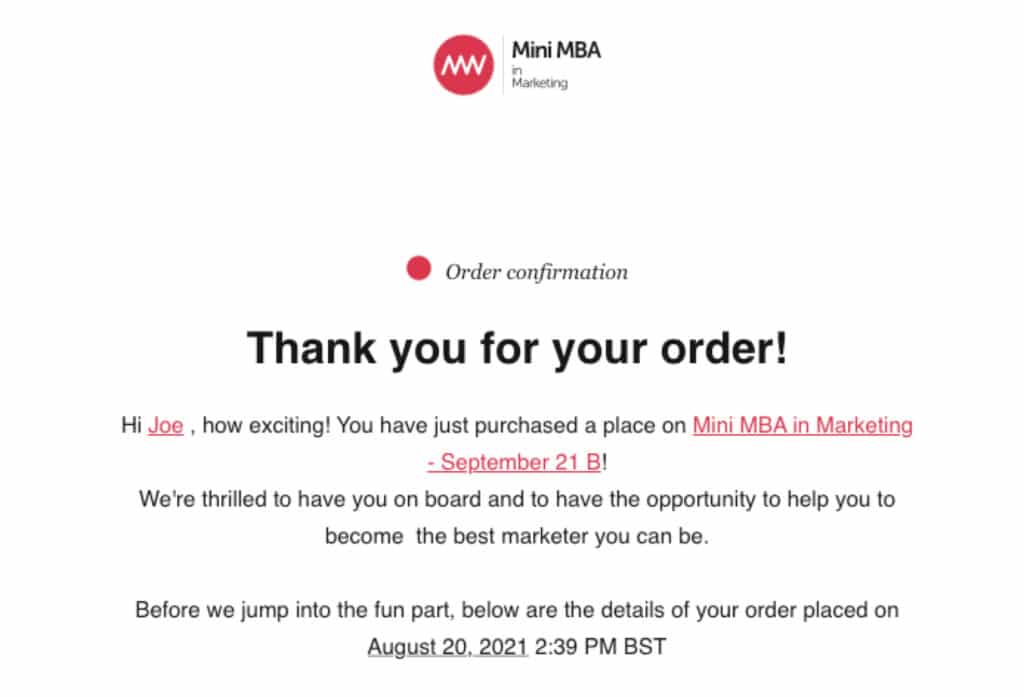
And then… well… I forgot! And this will be my main criticism of the course.
I was so excited to join up, but then I more or less had to be reminded that it was starting by some friends because the ‘ramp up’ email communication was fairly non-existent. I don’t think I missed any emails.
But, come September 14th, I clicked into the course area to find the first module was available. As a marketer marketing to marketers, (try saying that three times getting faster) it’s always going to be a tough gig – but this did feel like a missed opportunity.
Nonetheless, what followed certainly made up for it.
The course structure, logistics, and how I interacted with the Mini MBA
When you enter the Mini MBA course area, you’re greeted with a page that looks like the image below (but with all ten modules, obviously!).
The Mini MBA in Marketing has ten modules, followed by an optional exam at the end:
- Market Orientation
- Market Research
- Segmentation
- Targeting
- Positioning
- Objectives
- Product
- Price
- Integrated Marketing Communications
- Distribution
Each module is released weekly, so you can’t skip ahead, and curated to reflect the diagnosis, strategy and tactics model. Delighted!
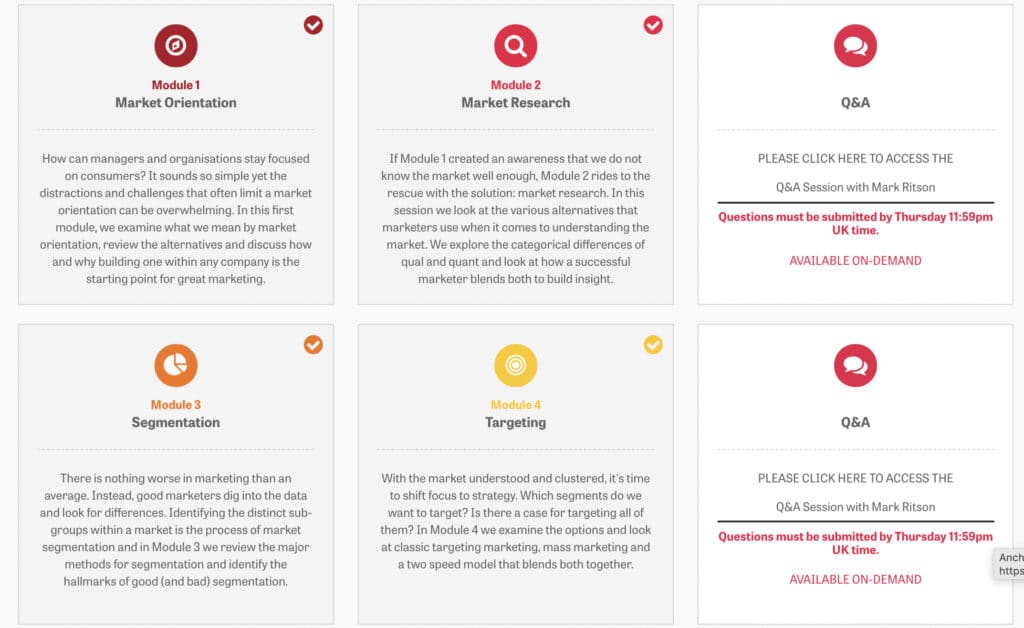
Once you click into each module, the screen looks as pictured below.
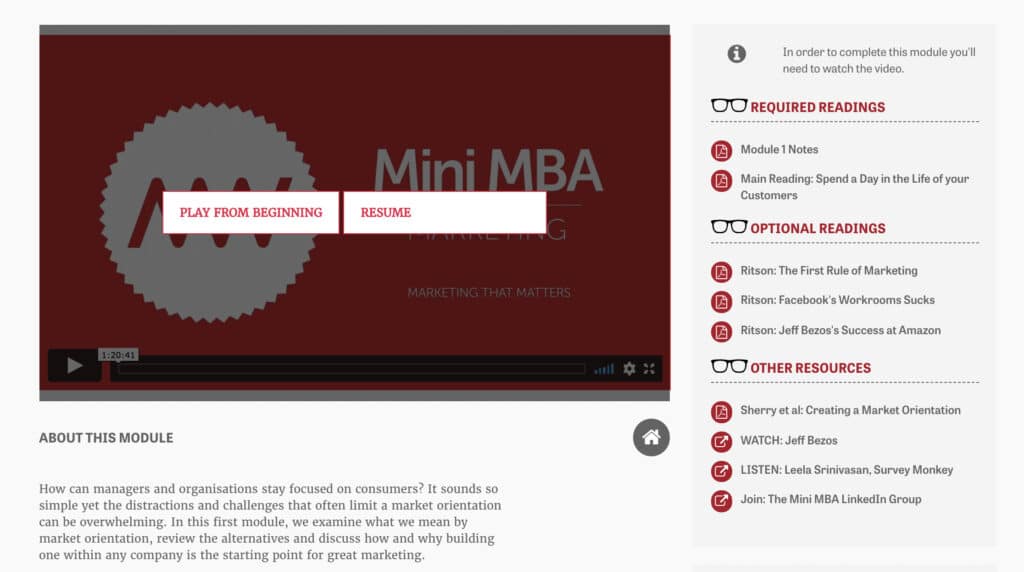
There is a presentation video for each module (usually between 40 and 1 hour 30 long), and then a required reading (usually an academic paper), optional readings (often Mark Ritson’s Marketing Week column or similar column), and other resources for all those eager beavers out there.
Mark explains how the resources work in the first module – but in doing so, I was also struck by something.
Mark, in my eyes at least, has gained a combative, controversial reputation in his columns. I was expecting this to also be reflected in his teaching style and how the course would play out.
What I actually came across was ‘Professor Ritson’. Someone a lot more caring than you’d think. Someone considerate of the fact not everyone is going to have time to read all the resources. And someone who’s clearly worked with his team to provide a course that works on levels based on the commitment people can give the course as part of their work and home schedules. If you can read everything, go for it – but it’s not the expectation. You can create your own experience based on what you can give to it.
The first video and explanation around the course was one of a considered, useful, pragmatic tone that stuck throughout the course. I found myself relaxing into it a lot more than expected, and felt encouraged rather than aggressively challenged. This was good.
The videos themselves have been produced to make them as entertaining as they can be, while also getting the information across. I’m not going to screenshot a topless Professor Ritson, but the treat awaits for those who embark on the course. Talk about maximising exposure…
I also found the production values really engaging and inspiring, I’m sure any content creator would feel the same.
Usefully, with the exception of the academic required readings, the optional reading was also provided in podcast form. More on that later.
Q&A with Mark Ritson
Every two weeks, there’s also a Q&A with Mark where, as students, you have the chance to ask questions about the previous two weeks, which Mark then answers in good detail.
Before I joined, I heard these were live Q&As, but for us at least – these were recorded videos answering our questions. This is clearly done for practical reasons (there were three cohorts on my start date so that would be a lot of questions) and it worked just fine for me. I watched each Q&A but would find myself scrolling through the videos to the places where Mark would answer the questions I was interested in, rather than watching the whole thing – so the recorded format was really accessible and flexible in that sense.
The Mini MBA LinkedIn group
(2023 Update: The Mini MBA Linkedin group has since moved to a dedicated community site. As far as I am aware, the Mini MBA no longer runs Linkedin groups. I am keeping this section here for completeness of my experience – but any new learners may have a different experience)
Also on offer is the LinkedIn group. For me, the group came into its own during the exam stage when folk were asking questions I found useful. It was free of bravado and everyone seemed to come in with the best of intentions, which was lovely. Anyone who knows me, knows that that’s the ethos of TMM too, so the Mini MBA group was right up my street in its interactions.
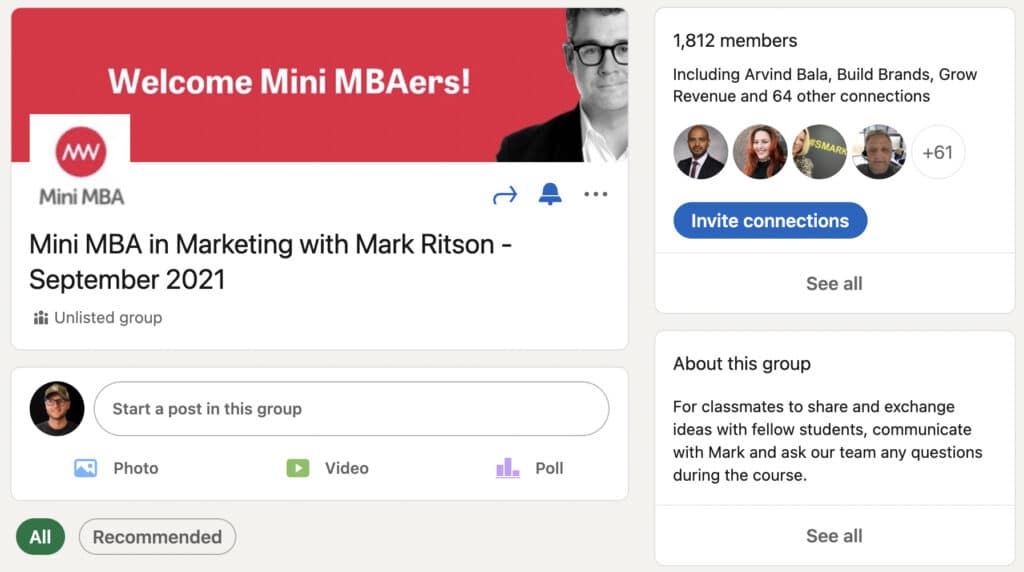
It was striking how diverse the group was, but also how the Mini MBA attracts marketers from some really recognisable brand names. That speaks volumes for the success of the programme.
Pleasantly, and particularly around exam time, Mark himself is active in the group. It’s nice to be able to have access to the professor that way.
The LinkedIn group is, however, susceptible to the same pitfalls of any LinkedIn group in terms of lack of visibility and notifications (I just wish they were better!). It’s a conscious act to find and engage with the group, which is fine, but not incredible. Having said that, this is far more representative of LinkedIn, rather than the Mini MBA itself!
How long do you need each week to complete the Mini MBA?
One of the biggest barriers to entry for me was whether I would have the time to justify the not-insubstantial cost of admission. I run a business. I have a ten-month-old daughter. I walk the dog for two hours a day. We’re all busy.
In total, the Mini MBA took 3-4 hours each week. Of this time, 1-2 hours were spent watching the weekly video presentation and rewatching key bits. Another hour was usually spent on the academic paper. I then listened to the audio recordings of the essential readings on my dog walks. That’s already a lot more accessible than sticking to traditional mini MBA books.
Each module is released at the weekend, so I found myself in a groove where on Sunday evening I would watch the video once my daughter was in bed. That would just leave an hour out of my working week for the paper, and fitting the audio recording into everything else.
Personally, this felt manageable and I looked forward to the module being released each week. After the course finished, I found myself on Sunday evenings at a loose end – I actually missed it a bit!
What did I learn on the Mini MBA?
For me, the biggest ‘on the job’ learnings came at the diagnosis and strategy stages – from market orientation through to objectives.
Specifically:
- The different kind of orientations a company can have, and why market orientation is superior
- Segmentation, especially using Mark’s meaningful/actionable grid; having a methodology that put me beyond just personas was really useful
- Zero-base budgeting, and how this can be aligned with the funnel to produce an estimated revenue figure for the end of the year based on marketing activity
- How to write meaningful objectives that effectively inspire action and change in the company
- One from the tactics: pricing and different methodologies to reach where you need to be. This was a big one, because pricing is hard!
It’s not the remit of this piece to explore these learnings, the lessons are best placed in context while doing the course. But, any one of them would have been worth the price of admission alone.
The course structure, placing these modules sequentially, was also useful as this is largely how it would be done in real life, too. That was a bit of a game changer – and again, really useful.
I found the tactics elements interesting, but as so much of the discourse around marketing in general focuses on tactics, there were fewer lightbulb moments for me at this stage of the course. Fundamentally though, everyone will learn different things as our experiences (and who we are as a ‘reader’) are all different. So, if you’re not familiar with ‘jobs to be done’ or the ‘long and the short of it’, you’ll have plenty to digest!
One drawback to the course is that the lessons are only available while your cohort is live. So it’s important to make the most of the videos and the learning while you have access to them. I understand there are plans for an app in 2022, but we’re yet to learn more about that.
The biggest takeaway from the Mini MBA with Mark Ritson
Outside the individual lessons, however, the biggest thing I took away from the Mini MBA was actually a framework upon which I can hang all marketing learning I have from this point onward.
Every week with The Marketing Meetup we listen and learn from amazing marketing minds. However, many of those lessons aren’t placed in the context of marketing as a whole. That’s justifiably so – we’d spend 20 mins of every session discussing how each concept discussed relates with the rest.
Before the diagnosis, strategy and tactics model (and subsequently the Mini MBA which went into far more detail on each), I had a pile of bricks on the floor. A lot of disparate ideas, and a fairly good idea of how to put them together to make a house – but one based on intuition with no-one telling me how to do it.
Doing the Mini MBA gave me the instruction manual. It’s given me a house to live in and a window to look at the rest of the world out of. Having that window will, ultimately, make me a better marketer. It’ll be important to look out of other windows, and even venture outside the house, but this one does feel sturdy.
And everything that follows, be it The Marketing Meetup, podcasts, conferences, or whatever, will be the decorations.
The nice thing is because of the past eight years of experience, I’ve already amassed a lot of very lovely decor indeed – but now it’s got somewhere to go. That’s why I’m able to go on the Mini MBA and still learn something. It’s also why a marketer only three days into their career will be able to learn too.
For me, the content is worth engaging with whether you’re learning or refreshing what you already know – or to torture the analogy more: amassing materials, building your home, or simply decorating it.
The Mini MBA exam
A lot of emphasis is placed on the exam. I’m going to be a bit cagey here about that because I don’t want to give it away. It’s nothing mad, or intimidating, but everyone else seems to maintain a code of silence so I will do so here, too.
I spent probably ten hours over two weeks coming up with my answers – although it could be completed a lot quicker, I’m just competitive. (Don’t mess with me at Monopoly).
Again, Mark is very pragmatic about whether you take the exam or not. He doesn’t want it to be a burden or a stressful experience. He’s also clear that it will be a nightmare for perfectionists – which I found quite liberating and a smart move, because as marketers we often don’t have access to 100% of the information we need to make decisions. The most stressful element I found was Mark did suggest there was ‘an answer’ to the exam, which caused me to second-guess myself a lot throughout the process.
For that reason, I sought out advice from friends who’d done the programme and also used the Linkedin group. In the spirit of collaboration, you are also given the option to make/join a team who can create a joint submission.
The exam is optional, but if you want my advice (that’s why you’re reading this, right?), I would plan to take it.
For me, the exam drew together the knowledge I’d been accumulating over the past ten weeks, and also it highlighted my weak spots (I think I rewatched the segmentation video at least three times as a result!).
It was a great dry-run before starting the process for myself in the real world. People have asked me whether the online course can be used out there, and I would say unequivocally the answer is yes – I’m more or less mimicking the structure of the course for our plans for 2022.
On a more logistical level – you get two weeks to complete the exam from the time of publishing, which for me was plenty, despite being away a week of that on a consulting trip. Deadlines focus the mind 🙂
University Joe: submits work 9PM on day it’s due.
Present day Joe: @markritson mini mba ready for submission three days in advance.
Funny how attitudes to learning change as you get older!
, Joe Glover (@josepheglover) November 24, 2021
Questions from the community about the Mini MBA…
Before writing this article, I asked The Marketing Meetup Facebook group if they had any questions I could answer for them. So, before summarising, here’s some direct answers 🙂
Who would it be good for? What kind of marketer would really benefit from this particular course? Or what kind of roles would it help / move you towards? How experience would you suggest you need to be to get the most out of it/not feel in over your head?
For me, it would be good for almost any marketer or business owner. I would say it is especially useful for the traditionally untrained as even eight years into my career, I gained a heck of a structure that will see me through the rest of my career.
I think everyone would take something different from it. I will be putting El, our new hire with no marketing experience, through the next cohort, because I think it will give her a grounding in marketing that will be fab. She’ll learn very different things to what I did, but both will be useful!
Should I do the Brand Management or the Mini MBA in Marketing?
I would recommend defaulting to the Mini MBA in Marketing, unless you are a person with ‘brand’ in your job title or in charge of many brands. There are other reasons you would pick the Brand Management course, but I would recommend watching the video on the homepage to choose.
How does it compare to other courses / educational teachings?
I did a Business BA, so this is all I can compare it to. I would say this was more practical, even though its basis is in academia. The course is pretty comprehensive as it takes you through the whole marketing journey in a fairly whistle-stop manner.
What would you add to improve it?
For me, I thought the email comms could be improved to build a sense of excitement. Compared to the rest of the course, this felt the main opportunity for improvement. I think it could also be communicated more clearly that the Q&As would be recorded videos rather than live sessions – but ultimately this was advantageous rather than detrimental, in my opinion.
Is everything applicable to SMEs as well as big business?
This is a great question because much of Mark Ritson’s teachings in the past have been focused on large businesses. Gladly, the answer is yes. The Mini MBA in Marketing is about marketing fundamentals. I think the Brand Management could be a different story, but I don’t know this for sure.
What were the real eye opening moments?
I had a few listed above – but the biggest for me was that framework for marketing that will see me through forever.
What is it that you get out of this course that you don’t get anywhere else?
There is a combination of Mark Ritson himself, the production values, how the course has been structured, the practically academic skew, and a view of marketing as a totality rather than focusing on one part of it.
Is the makeup of the cohort important?
For me, it wasn’t particularly impactful, but was impressive.
Is there enough time to complete the Mini MBA while working? How many hours a week did it take to do?
For me, yes, there was. Around three hours per week.
Does he say f*** in it?
Surprisingly little.
How much theory/method is there? CIM gives you lots of frameworks and acronyms, but what about how to do the day to day stuff…
You won’t get ‘this is how to do SEO’. I think the course comes into its own when planning, but the lessons will frame how you think on a daily level – informed by that plan.
Is it worth doing if you’ve already done a diploma with CIM or IDM?
I haven’t done them, I’m afraid!
What are the Mini MBA assignments/ exams like? Is it reliant on your job or completely separate?
Separate. The exam is reflective of the course, not your job.
As you were going through it, for how much of it did you think ‘I can do this in my role right now, and it’s going to be amazing’? Also, how useful were the strategic bits?
Loads! And very.
Is it more appropriate to client-side vs agency side or consultancy and is it focused on B2C and big brands or equally relevant to B2B and B2B?
I think all of the above. Mark got a lot of questions about this in the Q&As, but because the concepts discussed are so ubiquitous, I don’t think it really matters. He suggested that 99% of marketing B2B/B2C is the same 🙂
Would I advise doing the Mini MBA in Marketing with Mark Ritson?
Did the Mark Ritson Mini MBA make me a better marketer? Yes. Undoubtedly.
Did it make me more confident? Yes.
Will I use it in the real world? Yes. I’ve already used the model as the basis for next year’s planning.
Would I recommend it? Absolutely.
